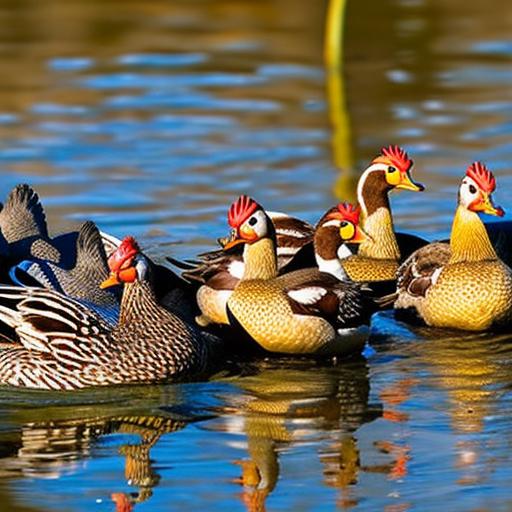Ducks and chickens are both popular choices for backyard poultry enthusiasts. They have their own unique characteristics and requirements, but many people wonder if they can coexist in the same coop. In this article, we will explore the differences between ducks and chickens and discuss whether or not they can be kept together.
Ducks are known for their webbed feet, waterproof feathers, and ability to swim. They are generally larger than chickens and have a more upright posture. Chickens, on the other hand, have scaly feet and feathers that are not waterproof. They are smaller in size and have a more horizontal posture.
There are several reasons why people may want to keep ducks and chickens together. One reason is that they can provide companionship for each other. Ducks and chickens are social animals and enjoy being part of a flock. Keeping them together can also save space and resources, as they can share the same coop and run area.
Key Takeaways
- Ducks and chickens have different housing requirements and may not be able to coexist in the same coop.
- Meeting the nutritional needs of ducks and chickens requires different types of feed.
- Keeping ducks and chickens together can increase the risk of disease and health concerns.
- Ducks and chickens have different behaviors and may not interact well with each other.
- It is possible for ducks and chickens to lay eggs in the same nesting boxes, but it may require additional management and cleaning.
Housing Requirements: Can Ducks and Chickens Coexist in the Same Coop?
When it comes to housing requirements, ducks and chickens have some differences that need to be taken into consideration. Ducks require more space than chickens due to their larger size and need for swimming water. They also prefer a different type of bedding material, as they produce more moisture in their waste.
Nesting and roosting preferences also differ between ducks and chickens. Chickens prefer to roost on perches, while ducks prefer to nest on the ground or in low nesting boxes. This means that separate areas should be provided for each species to meet their individual needs.
Aggression can also be a potential issue when keeping ducks and chickens together. Male ducks, known as drakes, can be aggressive towards other males during breeding season. This aggression can extend to chickens if they are seen as competition for resources or mates. It is important to monitor the flock closely and separate any individuals that show signs of aggression.
Feeding Considerations: Meeting the Nutritional Needs of Ducks and Chickens
Ducks and chickens have different dietary requirements and feeding habits. Ducks are omnivores and require a diet that includes both plant matter and animal protein. They also have a higher need for niacin, which can be found in certain types of feed or through supplementation.
Chickens, on the other hand, are primarily herbivores and can thrive on a diet that consists mainly of grains and vegetables. They require less protein than ducks and have a lower need for niacin.
To ensure that both species get the nutrients they need, it is important to provide separate feeding areas. This will allow each species to eat their preferred food without competition. It is also important to provide access to fresh water at all times, as ducks have a higher need for water due to their swimming habits.
Health Concerns: Identifying Potential Risks and Diseases When Keeping Ducks and Chickens Together
When keeping ducks and chickens together, there are certain diseases that can affect both species. One example is avian influenza, which can be transmitted between ducks and chickens through direct contact or contaminated surfaces. Other diseases, such as Marek’s disease and coccidiosis, can also affect both species.
To prevent the spread of diseases, it is important to practice good biosecurity measures. This includes keeping the coop clean and disinfected, quarantining new birds before introducing them to the flock, and monitoring for any signs of illness. If any birds show symptoms of disease, they should be isolated and treated accordingly.
Behavioral Differences: How Do Ducks and Chickens Interact with Each Other?
Ducks and chickens have different social hierarchies and ways of communicating with each other. Chickens establish a pecking order within their flock, where dominant individuals assert their dominance by pecking at lower-ranking individuals. Ducks, on the other hand, do not have a strict pecking order and tend to be more egalitarian in their social interactions.
Ducks communicate with each other through a variety of vocalizations, including quacks, whistles, and honks. Chickens, on the other hand, communicate through a series of clucks, cackles, and crowing. These differences in communication can sometimes lead to misunderstandings or conflicts between the two species.
Egg Production: Can Ducks and Chickens Lay Eggs in the Same Nesting Boxes?

Ducks and chickens have different egg-laying habits and preferences. Chickens typically lay their eggs in nesting boxes that are elevated off the ground. They prefer a dark and secluded area for nesting.
Ducks, on the other hand, prefer to lay their eggs on the ground or in low nesting boxes. They do not require the same level of privacy as chickens and are less particular about the location of their nests.
To accommodate both species, it is important to provide separate nesting areas. This will allow each species to lay their eggs in a location that meets their individual preferences.
Cleaning and Maintenance: Managing the Mess When Keeping Ducks and Chickens Together
When it comes to waste management, ducks and chickens have some differences that need to be taken into consideration. Ducks produce more moisture in their waste due to their swimming habits, which can lead to a wetter and messier coop environment.
To keep the coop clean and odor-free, it is important to provide adequate bedding material that can absorb moisture. Regular cleaning and maintenance should also be done to remove any accumulated waste and prevent the buildup of bacteria.
Noise Level: Comparing the Vocalizations of Ducks and Chickens
Ducks and chickens have different vocalizations and noise levels. Chickens are known for their loud crowing, especially in the morning when they announce the start of a new day. Ducks, on the other hand, have a softer and more varied vocalization repertoire.
If noise becomes a problem, there are several strategies that can be used to manage it. Providing a quiet and secluded area for nesting can help reduce noise from chickens. Ducks can be trained to be quieter through positive reinforcement techniques.
Predators: Protecting Your Flock from Common Threats
Both ducks and chickens are vulnerable to a variety of predators, including raccoons, foxes, and birds of prey. It is important to take steps to protect your flock from harm.
Some strategies for predator protection include using secure fencing, providing adequate shelter, and using deterrents such as motion-activated lights or sound devices. It is also important to supervise the flock during free-ranging time and bring them inside at night to minimize the risk of predation.
Weighing the Pros and Cons of Keeping Ducks and Chickens Together
In conclusion, keeping ducks and chickens together can have its benefits and drawbacks. On one hand, they can provide companionship for each other and save space and resources. On the other hand, they have different housing requirements, dietary needs, and social behaviors that need to be taken into consideration.
Before deciding to keep ducks and chickens together, it is important to carefully consider these factors and make sure that you are able to meet the needs of both species. With proper planning and management, it is possible to successfully keep ducks and chickens together in the same coop.
If you’re considering keeping ducks and chickens together, it’s important to understand the dynamics between these two species. While they can coexist harmoniously, there are certain factors to consider. One important aspect is providing adequate space for both ducks and chickens to thrive. In a related article on Poultry Wizard, you can learn about the ideal chicken coop door size to ensure the comfort and safety of your feathered friends. To read more about this topic, click here.
FAQs
What are the differences between ducks and chickens?
Ducks and chickens are different in terms of their physical appearance, behavior, and needs. Ducks have webbed feet, waterproof feathers, and a flat bill, while chickens have scaly feet, non-waterproof feathers, and a pointed beak. Ducks are also more aquatic and require a body of water to swim in, while chickens prefer to stay on land.
Can ducks and chickens live together?
Yes, ducks and chickens can live together as long as they have enough space and resources. However, it is important to note that ducks have different needs than chickens, so their living environment should be suitable for both species.
What are the benefits of keeping ducks and chickens together?
Keeping ducks and chickens together can provide several benefits, such as increased egg production, pest control, and entertainment. Ducks are known to eat insects and snails, which can help reduce the population of pests in the area. Additionally, ducks and chickens can be entertaining to watch and can provide a sense of companionship.
What are the challenges of keeping ducks and chickens together?
One of the main challenges of keeping ducks and chickens together is that they have different dietary needs. Ducks require more water and protein in their diet, while chickens need more calcium. Additionally, ducks can be messy and produce more waste than chickens, which can lead to sanitation issues if not properly managed.
What should be considered when keeping ducks and chickens together?
When keeping ducks and chickens together, it is important to provide enough space and resources for both species. This includes providing a suitable living environment, such as a coop and a pond or water source for the ducks. It is also important to monitor their behavior and health regularly to ensure they are getting along and not showing signs of illness or stress.
Meet Walter, the feathered-friend fanatic of Florida! Nestled in the sunshine state, Walter struts through life with his feathered companions, clucking his way to happiness. With a coop that’s fancier than a five-star hotel, he’s the Don Juan of the chicken world. When he’s not teaching his hens to do the cha-cha, you’ll find him in a heated debate with his prized rooster, Sir Clucks-a-Lot. Walter’s poultry passion is no yolk; he’s the sunny-side-up guy you never knew you needed in your flock of friends!







